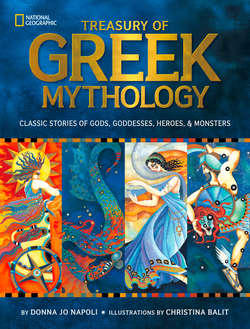Читать книгу Treasury of Greek Mythology: Classic Stories of Gods, Goddesses, Heroes & Monsters - Christina Balit - Страница 10
Оглавление
Young Zeus clambered up the rocks behind a billy goat. He walked the mountain ridge and stopped on the highest peak of Crete to look out over the salt-white sea that stretched to Africa. He turned and there was Gaia, his grandmother, who had raised him.
“You’re strong enough,” she said. “It’s your turn.”
Zeus’ heartbeat raced. It filled his head. It filled his whole self. He needed no further information or encouragement. His father, Cronus, had swallowed his brothers and sisters at their births. Zeus had escaped only because his mother, Rhea, had fooled the fear-crazed man into swallowing a stone instead. The boy had grown strong, fearsome, clever. He now went quickly to meet his father for the first time. He was primed for this. Armed. This was the moment of defeat or victory, yet his nerves were steady. He felt strangely elated.
While Zeus journeyed, Gaia reached out to Cronus and crooned in rocking tones that penetrated in that deep way only a mother’s voice can. The suggestion was too powerful; Cronus doubled over. The stone and children within spewed forth from his mouth, landing at the feet of the newly arrived Zeus.
The five older children of Cronus—Hestia, Poseidon, Hades, Demeter, and Hera—aligned themselves with Zeus against their father. What else could they do? Zeus meant freedom, a delicious new idea.
But Cronus had brothers and sisters, too. He called the Titans to his side.
War began. And continued, as wars will do. For ten years the battle scorched the earth, smoked the skies, sullied the waters. Bitter as bile, it wore away at everyone’s spirits. Until Gaia, the earth mother who had started all life, told Zeus he would win if he liberated her other children—his misshapen uncles and his one-eyed uncles—that Cronus had cast into Tartarus, the Underworld.
WARS of Ancient Greece
Mythological wars might reflect stories about real prehistoric wars. The war between the Titans and Olympians lasted ten years, according to the ancient Greek poet Hesiod. Another great war, between Greece and Troy, also lasted ten years, according to the poet Homer. (Poets were often the historians of their age.) We have no information about actual wars from before or during the lives of these poets.
An ancient Greek soldier
Zeus never wasted a moment on second thoughts. He freed the three brothers with fifty heads and one hundred hands each. He freed the three Cyclopes. In surprised gratitude, the Cyclopes gave Zeus the spitting lightning bolt and deafening thunder with which to split the skies and flame the earth. They gave his brothers gifts, too. On Poseidon they bestowed a sharp, gleaming trident with which to smite the seabeds and raise massive waves. To Hades they gave a helmet of invisibility with which to disappear.
These hundred-handed and one-eyed brothers fought beside their nieces and nephews, all against the Titans. And the nephews let loose with their newly gained ferocity. No longer was the battle simply hurling rocks and spears, and crushing the enemy with axes. Oh, no. Zeus hurled bolts, burned the forests, and left them smoldering. He cast flames so hot the seas boiled and parts of the Earth melted. Poseidon shook the Earth so rivers crashed through their sidewalls. Hades raced unseen among all, stabbing, smashing, maiming.
As Zeus saw it, the war amounted to old against young, and the young gods won, as they had to. That is the nature of things. By the end of the war, both sets of gods fought from mountaintops—the Titans from Mount Othrys, the young gods from Mount Olympus. So after the war the young gods were known as the Olympians.
Zeus had the Titans sealed in Tartarus with the hundred-handed ones as guards. Gaia was flummoxed. What was the point of locking away the Titans? Why did Zeus have to be as vengeful as his father? And so she gave birth to her last child, the monster Typhon. From his shoulders sprang a hundred serpentine heads with flickering black tongues uttering every noise imaginable—human, bestial, thunderous. Typhon’s eyes flashed fire. Everyone fell back in terror. Except Zeus. He had lightning, a force unsurpassed. He burned off Typhon’s heads and banished him to become wild winds that cursed sailors on the high seas. Zeus was the undisputed king.
Gaia gave birth to the monster Typhon, hoping he could stand up to his bully brother Zeus. But the weapon of the thunderbolt allowed Zeus to conquer Typhon’s hundred heads.
The Olympian brothers divided up rulership of the universe. Poseidon took the seas; Hades, the Underworld; Zeus, everything else. The division wasn’t equal, and the Olympian sisters were left out entirely. But that was typical of Zeus. He was brought up to believe he was entitled. Nothing ever changed his mind.
